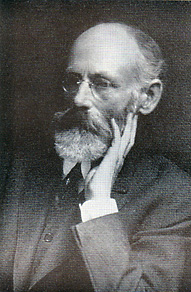Über die Pflege der Konzentrationsfähigkeit
 Robert Crosbie (1849-1919)
Robert Crosbie (1849-1919)
Das Mind (Engl.), das Denkprinzip, manas (Sansk.), wird in den Weisheitslehren als Dreh- und Angelpunkt für die Entwicklung des Menschen beschrieben. Das Mind – und nur das Mind – verursacht alle Bindungen. Zumeist binden wir uns an das, was angenehme Gefühle erzeugt. Aber auch ausgeprägter Hass hat eine bindende Wirkung, die – so heißt es – langlebiger und kraftvoller sein kann, als Bindungen, die aus Wohlgefallen entstehen. Das Mind kann aber auch ER=LÖSEN. Wenn das ständig seine Umwelt differenzierende Mind mit allem Differenzieren aufhört, verlieren die Bindungen Halt und Stärke. Dann kann sich das UNIVERSELLE MIND in einem OFFENBAREN. Aber wie das Mind zur Ruhe bringen? Wie diesen ungezähmten Affen, der ständig von einem Ast zum anderen springt, jetzt dies und gleich darauf das macht? Durch KONZENTRATION. Der Sucher MUSS Konzentration lernen, will er sich langfristig aus dem Gestrüpp seiner Bindungen befreien. Robert Crosbie (1849-1919), Gründer der United Lodge of Theosophists (ULT), hat dazu zeitlos gültige und zeitgemäße Hinweise aufgeschrieben (Redaktion).
Culture of Concentration
Concentration, or the use of the attention in the direction of anything that we wish to do, consistently and persistently, has long been recognized as the most effective means of arriving at the full expression of our powers and energies. The ancients called the power to focus the attention upon a subject or object for as long a time as is required, to the exclusion of every other thought and feeling, ‘one-pointedness.” Concentration is difficult to obtain among us as a people, because the key-note of our civilization is, in fact, distraction rather than concentration. Constantly and in every direction we are having presented to our minds objects and subjects—one thing after another to take our attention and then to pull it off from what we are putting it on. So, our minds have acquired the tendency to jump from one thing to another; to fly to a pleasant idea or to an unpleasant idea, to remain passive. Remaining passive is normally sleep; abnormally, its tendency is towards insanity. That we have become habituated to these distractions and are not able to place our minds on any given thing for any length of time may be easily proved by anyone. If he will sit down and try to think of one single thing, one single object or subject, for only five minutes, he will find even in a very few seconds, perhaps, that he has wandered miles away mentally from the thing he intended to place his mind upon.
We have first to understand what man is, his real nature, what the cause of his present condition, before we can arrive at any pure and true concentration, before we can use the higher mind and the powers that flow from it. For the powers that we use in the body are transmitted powers, drawn, indeed, from our inner spiritual nature, but so disturbed and limited that they are not powerful. We need to know about our minds, and we need to control our minds—that is, the lower mind, occupied with personal and physical things, known in Theosophical phraseology, as Lower Manas. It is this “organ,” the thinking principle, which the ancients said is the great producer of illusion—the great distracter of concentration. For there is no possibility of obtaining real concentration until the possessor of the mind can place it where he will, when he will, and for as long a time as he pleases.
The Mind is the great slayer of the REAL
It is written in The Voice of the Silence: ‘ Mind is the great slayer of the Real. Let the disciple slay the Slayer.” The disciple, who is the Real Man—the spiritual man—has to act as such. He has to stop the switchings and fittings of his thinking principle and become calm in that knowledge to which the consideration of his own true nature brings him. The object of all advancement is the realization of the true nature of each one and an employment of the powers which belong to it. What hinders is the thinking principle. We are the thinkers, but we are not what we think. If we think wrongly, then all the results of our thoughts and actions must lead to a wrong conclusion, or to a partial one, at best; but if we realize that we are the thinker, and the creator—the evolver of all the conditions through which we have been, in which we now are, and in which we shall find ourselves in the future—then we have reached the point of view of the Real man, and it is only to the Real man that the power of concentration belongs.
Again, in order to obtain concentration, we need an understanding of the classification of the principles of man. We all have the same principles, the same kinds of substances within us, the same spirit within us. We all contain every element that exists anywhere or in any being. So, too, each one has all the powers that exist anywhere, in himself, though latent. We are all of the same Source, all parts of one great Whole, all sparks and rays from the Infinite Spirit, or the Absolute Principle. The second principle is Buddhi, or the acquired wisdom of past lives, as well as this one. It is the cream of all our past experiences. The next principle is Manas, the Higher mind, the real power to think, the creator—not concerned with this physical phase of existence, but with the spirit and the acquired wisdom. These three principles together make the Real Man—Atma Buddhi-Manas—and these three each one of us is in his inner nature.
Our Lower Manas is the transitory aspect of the Higher mind; that is, the portion of our attention, our thoughts and feelings addressed to life in a body. But if our thinking faculty is concerned only with the personal self—only with the body— the powers which reside in the Triad, the Real man, and the acquired wisdom of the past, can not force themselves through that cloud of illusion. Lower Manas is the principle of balance. It is the place from which the man in a body either goes up towards his higher nature or down towards his earthly nature, made up of the desires pertaining to sensuous existence. Life about us is throwing its impressions and energies upon us all the time. We are constantly subject to them and connected with them by our ideas, our feelings and emotions, so that there is a constant turmoil going on within that inner mind which makes a barrier to absolute calmness and concentration.
Then we have the astral body, itself an aspect of the real inner body which has lasted through the vast period of the past and must continue through the far distant future. This astral body is the prototype, or design, around which the physical body is built, and which, considered from the point of view of the powers, is the real physical body. Without it the physical body would be nothing but a mass of matter—an aggregation of smaller lives. It is the astral body which contains the organs, or centers from which the organs have been evolved in accord with the needs of the thinker within. The real senses of man are not in the physical but in the astral body. The astral body lasts a little over one lifetime. It does not die when the physical body dies, but is used as a body in the immediate after-death states.
Now as soon as we begin to make the effort to control the mind, and desire to know and to assume the position of the inner man, the effort and the assumption bring an accession of power and of steadiness. We have started something going in the astral body. What were before merely centers of force around which organs were builded now tend to become separate astral organs. A gradual building of those organs goes on within us, until in the completion of our effort we have an astral body, with all the organs of the physical completely synthesized, and we are beyond the vicissitudes of physical existence; we have the power of the action of the astral body. The astral body is even more complete and effective on its own plane that our bodily instrument here on the physical plane, for it has a wider range of action in its seven super-senses, where physically we have use of only five senses.
First, and most potent, is anger
Many hindrances arise, however, as soon as the effort is begun. Old habits of thought and feeling press us on every hand, because we have not yet been able to check our responsiveness to them, and so we find ourselves subject to certain feelings and emotions which tend to destroy that astral body which is being built. First, and most potent, is anger. Anger has an explosive effect, and no matter how much we may have progressed in our growth, the uncontrollable inner shock coming from anger will tear that inner body to pieces so that the work has to be done all over again. Next to contend with is vanity—vanity of some kind or another, of some accomplishment, of ourselves, our family, our nation, or what not. Vanity tends to grow and grow, until finally we will not listen to anybody and are too vain to learn anything. So, vanity tends to disintegrate this inner body, although it is less disruptive than anger. Envy is another hindrance. Fear is another, but fear is the least of them all because it can be destroyed by knowledge. Fear is always the child of ignorance. We fear those things we do not know, but when we know, we do not fear.
We are all a prey to those fears that tend to disrupt the very instrument by means of which true concentration may be attained; but it may be attained. The peculiar power and nature of concentration is that, when complete, the attention can be placed on any subject or object to the exclusion of every other for any given length of time; and this thinking principle—this mind of ours which has been flitting about—can be used to shape itself to the object gazed upon, to the nature of the subject thought about. While the mind takes the shape of the object, we get from that shape the form, the characteristics of every kind that flow from it; and when our inquiry is complete, we are able to know everything that can be known of the subject or object. Such a height of concentration we can easily see is not to be attained by intermittent efforts, but by efforts made from “a firm position assumed” with the end in view. All efforts made from that basis are bound to be of avail; every effort made from the point of view of the spiritual man counts, because it makes the body subservient to the thinking principle.
Other things come about from that true power of concentration. We begin to open up the channels that reach from our brains to the astral body, and from the astral body to the inner man. Then, that which is temporary tends to become a part of that which is eternal. All the planes become synthesized from above down, and all the vestures of the soul which we have evolved from the past become in accord with each other. It is just like the tumblers in a lock: when they work together, the lock works accurately. So we have to bring all the sheaths of the soul into exact accord, and that we can do only by taking the position of the spiritual being and acting as such.
The height of concentration is possible to us, but not on a selfish basis. The concentration of the brain mind stands beside true concentration as a rush light beside the sun. True concentration is, first of all, a position assumed out of regard for the end in view of union with the Higher Self. That is the highest Yoga. Concentration upon the Self is true concentration. And concentration must be attained before we can ever reach that stage where eternal knowledge of every kind is ours to the last degree; before we shall once more resume and wield those powers which are the heritage of all.
(Zwischenüberschrift, Hervorhebung von Redaktion)
 Quelle: THE FRIENDLY PHILOSOPHER, Robert Crosbie, Los Angeles und New York, 1945
Quelle: THE FRIENDLY PHILOSOPHER, Robert Crosbie, Los Angeles und New York, 1945
Mögliche Verfügbarkeit von FRIENDLY PHILOSOPHER (ohne Gewähr)
Zuletzt aktualisiert: 27.10.2007 von Heinz Knotek






